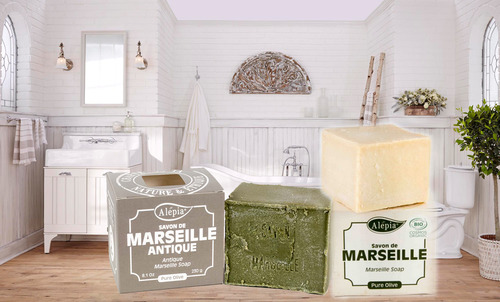
Marseille soap or Savon de Marseille is a traditional hard soap made from vegetable oils that has been produced around Marseille, France, for about 600 years. Traditionally, the soap is made by mixing sea water from the Mediterranean Sea, olive oil, and the alkaline chemicals soda ash (sodium carbonate) and lye (sodium hydroxide) together in a large cauldron (usually making about 8 tons). This mixture is then heated for several days, stirring constantly. The mixture is allowed to sit until ready, then poured into a mold and allowed to set slightly. While still soft it is cut into bars, stamped, and left to completely harden. The whole process can take up to a month.
How to recognise genuine Marseille soap?
It is unfortunately easy to find on the market, so called savon de Marseille which in fact is a far inferior to the true Marseille soap. So how to be sure you get a genuine product?
Vegetable oils, no fragrance, no color.
A Marseille soap is traditionally shaped as a cube whose weight goes from 300 grams to 1 kilo for biggest. A real Marseille soap never contains saponified animal fat, which is called Sodium Tallowate in the INCI list of ingredients. It is always made with vegetable oils, which give this soap its natural color.
Color
Green: Olive oil based.
White: Coco or palm oil based.
Green or white, a genuine Marseille cube soap has no added fragrance and must contains a minimum mandatory of 72 % of extra pure saponified oil.
Since it must also be dye-free, its color will change as it is aging and turn beige, pale white or brown.
The saponification process
Above all, a genuine Marseille soap must have been handcrafted according to the ancestral method of saponification. This rigorous method requires not only a patient cooking in a cauldron, but also many critical steps during all the manufacturing process. That is through this method of saponification that genuine Marseille soaps get their best features which make them so famous.
Very popular in France and abroad, Marseille soap is a simple product whose qualities have been vaunted for centuries. Traditional Marseille soap is made from oils of 100% vegetable origin. It is therefore naturally eco-friendly: it is biodegradable (100% in under 28 days) and does not pollute the environment (particularly water), unlike industrial soaps and detergents that are made from petrochemical compounds. Finally, due to its method of manufacture by cooking and slow drying, it is economical and can last twice as long as conventional soap.
Body Care
Free of fragrance, colouring and synthetic additives, traditional Marseille soap is naturally gentle and hypoallergenic, and does not irritate the skin. Back in the 19th century, it contributed to the decline in infant mortality and infectious diseases. It is antiseptic and can be used to disinfect wounds. Midwives also recommended it for washing infants and their clothes.
Household Use
Traditional Marseille soap cleans clothes efficiently with no risk of allergy. Some people still make their own detergent, as our grandmothers used to do. It removes the most stubborn stains on carpets and delegate fabrics alike.
Traditional Marseille soap has always been the favourite of those who take particular care of their health – customers who are demanding in the selection of products they use every day and mindful of the environment.
Experience the uniqueness of traditional Marseille Soap today.
Alepia Organic Marseille Pure Olive Soap – 230g
Alepia Antique Marseille Soap: Pure Olive – 230g
Alepia Liquid Marseille Soap – 500ml




